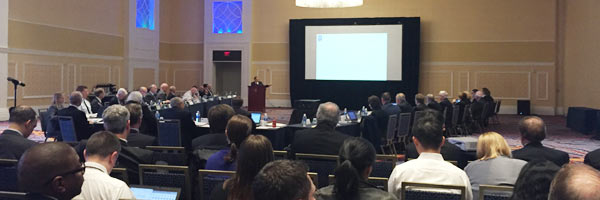Blog Editor’s Note: The semiannual in-person meeting of the US National Spaced-based PNT Advisory Board was held last week in Redondo Beach, CA. Its agenda with links to all presentations received is available on line. Once approved, the minutes of the meeting will be posted at the same site.
The below article was authored by RNTF President Dana A. Goward.
Industry, European Efforts Featured at PNT Advisory Board Meeting

In addition to regularly expected updates for GPS systems and U.S. government activities, this week’s meeting of the National Space-Based Positioning, Navigation, and Timing Advisory Board included discussions with industry representatives and officials from Europe.
Jean-Yves Courtois, CEO of Orolia, and Jeremy Warriner, Director of Government Systems at Microsemi, discussed the industry’s readiness to help secure GNSS receivers with anti-jam and anti-spoof technology, and protect signals with interference detection systems.
The two companies agreed that wider use of more sophisticated receivers was needed, especially in critical applications and infrastructure. Both are very active educating their customers about this need, and both urged more education and encouragement from the government. They differed, though, on how strong a role the government should play in certifying equipment or establishing receiver performance requirements.
Both Courtois and Warriner indicated that establishing an interference detection and reporting network that was crowd sourced from existing receivers would not be a difficult technical problem.
A key takeaway from both speakers was that, while companies are able and eager to help, the commercial sector does not have the incentives nor resources to solve these problems on its own. There is a real role for government and some leadership also is required.
The board also received an update on Europe’s many activities to protect, toughen and augment GNSS.
Dominic Hayes from the European Commission (EC) discussed a number of efforts. These included studies to detect and characterize jamming. He said the EC was investigating crowd sourcing such information. He also mentioned that “spoofing” was a more politically charged issue than jamming, and the EC was deferring to member states to investigate and take action to counter that threat. Hayes added that the Commission was moving forward on resilience and augmentation issues. They had concluded that a single backup system for Galileo/GNSS PNT was not going to be able to meet the needs of all users.
Hayes’ presentation was followed by one discussing alternative PNT investigation in Europe by Dr. Okuary Osechas of the German Aerospace Center. His main focus was on near, medium and long term PNT schemes for aviation. Enhancement of existing systems is foreseen in the short and medium term. For the long term, both enhanced DME and eLoran are being studied.
Both Mr. Hayes and Dr. Okuary emphasized Europe’s desire to work and coordinate with the United States on a wide variety of PNT issues.


